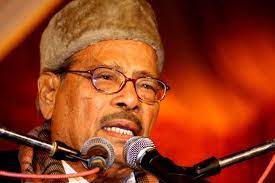
Picture: Social Media
Noted singer Manna Dey was born on May 1, 1919, in Kolkata. His original name was Prabodh Chandra Dey but he was better known as Manna Dey. His versatility in playback singing make him legend is cherished in Indian music industry. Manna Dey was passing away on October 24, 2013, in Bangalore, Manna Dey’s career spanned over five decades. His melodious voice, impeccable classical training, and ability to sing in various languages and styles made him a legendary figure in the Indian music industry. He sang over 4000 songs in various languages.
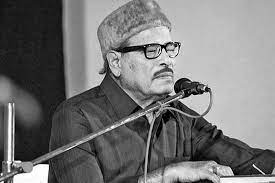
Picture: Social Media
Manna Dey received several prestigious awards from the Government of India for his outstanding contributions to Indian music. He was honoured with the Padma Shri in 1971, followed by the Padma Bhushan in 2005 and Dadasaheb Phalke Award in 2007, the most prestigious award in Indian cinema. He also won several National Film Awards for Best Male Playback Singer and Filmfare Awards. His soulful rendition of classical and semi-classical songs made him a beloved figure in the industry.
Manna Dey was born into a family with a deep-rooted musical heritage. His father, Purna Chandra Dey, was a well-known Sangeetacharya (music teacher) and his maternal grandfather, K.C. Dey, was a famous music composer and singer in the early days of Indian cinema. Manna Dey’s musical education began at home, and he received formal training in Hindustani classical music from eminent musicians like Ustad Abdul Rahman Khan and Ustad Aman Ali Khan.
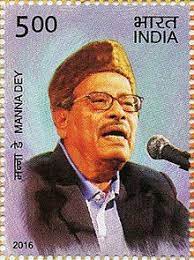
Picture: Social Media
Manna Dey’s journey as a playback singer started in the early 1940s when he got an opportunity to sing for All India Radio, Kolkata. He also worked as an assistant music director to his uncle, K.C. Dey, in Bombay Talkies, a film production company.
Career’s first song:
Manna Dey started his career in playback singing with the film “Tamanna” (1942). The musical score was by Krishna Chandra Dey and Manna sang a duet with Suraiyya “Jago Aayee Usha Ponchi Boley Jago” which was an instant hit.
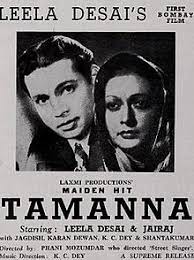
In 1943 that he got a chance his first solo break with film Ram Rajya. Actually, film’s producer Vijay Bhatt and its composer Shankar Rao Vyas had contacted K C Dey with an offer for playback in the film. But K C Dey refused because he does not want lend his voice to other actors, they spotted Manna Dey sitting in the corner of the room and offered him the opportunity.
Composer Shankar Rao Vyas taught Manna Dey the songs and he chose to sing them in his uncle’s distinct style. He started the illustrious career what he dreamt for with the first solo song “Gayi tu gayi Seeta sati” (Ram Rajya, 1943).
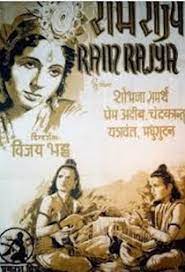
Manna Dey was known for his versatility as a singer. He sang in numerous languages, including Hindi, Bengali, Marathi, Gujarati, Kannada, Assamese, Punjabi, and many others. He was highly proficient in classical music and had a distinctive voice that made him suitable for a wide range of genres, from classical to folk, romantic to devotional.
Manna Dey lent his voice to countless hit songs during his career. Some of his most memorable songs include “Ae Mere Pyare Watan” from Kabuliwala, “Laga Chunri Mein Daag” from Dil Hi to Hai, “Ae Bhai Zara Dekh Ke Chalo” from Mera Naam Joker, “Zindagi Kaisi Hai Paheli” from Anand, and “Ek Chatur Naar” from Padosan. His classical duets with Lata Mangeshkar and Asha Bhonsle were particularly renowned.
Manna Dey continued to perform and record music well into his later years. He remained active in the industry, even mentoring young singers. His last recorded song was for the film “Umar” in 2006.
Manna Dey’s Personal Life
Manna Dey was married to Sulochana Kumaran. The couple had two daughters – Shuroma Herekar (1956-2016), a U.S. based scientist and his second daughter Shumita Dev (b. 1958), a Bangalore-based businesswoman. Sulochana Kumaran died in Bengaluru in 2012. She was suffering from cancer for some time. After her death, Manna Dey moved to Bengaluru after spending more than fifty years in Mumbai.
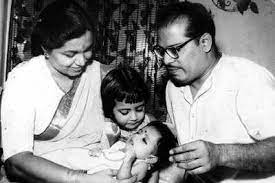
Picture: Social Media
He passed away on October 24, 2013, at the age of 94, leaving behind a rich and enduring legacy in Indian music.
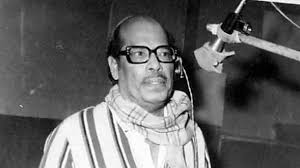
Picture: Social Media
Manna Dey’s contribution to the world of Indian music, particularly his mastery of classical and semi-classical forms, is celebrated to this day. His soulful voice and timeless melodies continue to be cherished by music enthusiasts and will be remembered for generations to come.
Filmography
Tamanna (1942)
Ramrajya (1943)
Jwar Bhata (1944)
Kavita (1945)
Mahakavi Kalidas (1944)
Vikramaditya (1945)
Prabhu Ka Ghar (1946)
Valmiki (1946)
Geetgobind (1947)
Ham bhi Insaan Hai (1948)
Rambaan (1948)
Awaara (1951)
Andolan (1951)
Rajput (1951)
Jeevan Nauka (1952)
Qurbani (1952)
Parineeta (1953)
Chitrangada (1953)
Do Bigha Zamin (1953)
Mahatma (1953)
Boot Polish (1954)
Baadban (1954)
Mahatma Kabir (1954)
Ramayan (1954)
Shree 420 (1955)
Seema (1955)
Devdas (1955)
Jai Mahadev (1955)
Jhanak Jhanak Payal Baje (1955)
Kundan (1955)
Ek Din Ratre(1956)
Chori Chori (1956)
Do Aankhen Barah Haath (1957)
Amar Singh Rathaur (1957)
Jai Ambe (1957)
Janam Janam Ke Phere (1957)
Johnny Walker (1957)
Laal Batti (1957)
Miss India (1957)
Narshi Bhagat (1957)
Naya Zamana (1957)
Pardesi (1957)
Parvarish (1958)
Amardeep (1958)
Post Box 999 (1958)
Daak Harkara (1958)
Anari (1959)
Chacha Zindabad (1959)
Deep Jwele Jaai (1959)
Kavi Kalidas (1959)
Navrang (1959)
Ujala (1959)
Madhu (1959)
Manzil (1960)
Angulimaal (1960)
Anuradha (1960)
Bambai ka Babu (1960)
Barsaat Ki Raat (1960)
Bewaqoof (1960)
Jis Desh Mein Ganga Behti Hai (1960)
Kala Bazar (1960)
Kalpana (1960)
Ganga (1960 film)
Kabuliwala (1961)
Main Shadi Karne Chala (1962)
Baat Ek Raat Ki (1962)
Dil Hi To Hai (1963)
Rustam Sohrab (1963)
Ustaadon Ke Ustaad (1963)
“Suhagan (1964)
Chitralekha (1964)
Waqt (1965)
Bhoot Bungla (1965)
Love in Tokyo (1966)
Teesri Kasam (1966)
Pyar Kiye Ja (1966)
Sankhyabela (1966)
Subhash Chandra (1966)
Upkaar (1967)
Raat Aur Din (1967)
Aamne Samne (1967)
Palki (1967)
Nawab Sirajdoula
Boond Jo Ban Gaya Moti (1967)
Antony Firingee (1967)
Duniya Nachegi (1967)
Padosan (1968)
Mere Huzoor (1968)
Neel Kamal (1968)
Ram Aur Rahim (1968)
Baghini (1968 film)
Chowringhee (film) (1968)
Ek Phool Do Mali (1969)
Chanda Aur Bijli (1969)
Chiradiner (1969)
Jyoti (1969)
Pratham Kadam Phool (1969)
Teen Bhubaner Pare (1969)
Pushpanjali (1970)
Nishi Padma (1970)
Mera Naam Joker (1970)
Bilambita Loy (1970)
Anand (1971)
Johar Mehmood in Hong Kong (1971)
Jane Anjane (1971)
Lal Patthar (1971)
Buddha Mil Gaya (1971)
Chhadmabeshi (1971)
Dhanyee Meye (1971)
Anubhav (1972)
Paraya Dhan (1971)
Reshma Aur Shera (1971)
Durbar Gati Padma (1971)
Chemmeen (Malayalam)
Alo Amar Alo (1972)
Har Mana Har (1972)
Picnic (1972 film)
Stree (1972 film)
Bawarchi (1972)
Jeeban Rahasya (1972)
Seeta Aur Geeta (1972)
Shor (1972)
Zindagi Zindagi (1972)
Avishkaar (1973)
Dil Ki Rahe (1973)
Hindustan Ki Kasam (1973)
Sampurna Ramayan (1973)
Saudagar (1973)
Zanjeer (1973)
Bobby (1973)
Basanta Bilap (1973)
Marjina Abdulla (1973)
Dukh Bhanjan Tera Naam (1974) punjabi movie
Nellu (Malayalam) (1974)
Resham ki Dori (1974)
Us Paar (1974)
Mouchak(1974)
Fuleswari(1974)
Sholay (1975)
Himalaya Se Ooncha (1975)
Sanyasi (1975)
Ponga Pandit (1975)
Jai Santoshi Ma (1975)
Deewaar (1975)
Sanyasi Raja(1975)
Selaam Memsaheb (1975)
Palanka (1975)
Das Mnambati (1976)
Mehbooba (1976)
Harmonium (1976)
Hotel Snow Fox (1976)
Anurodh (1977)
Minoo (1977)
Satyam Shivam Sundaram (1978)
Jurmana (1978)
Ganadevata (1978)
Charmurti (1978)
Dui Purush (1978 film)
Gautam Govinda (1979)
Devdas (1979 film)
Heere Manik (1979)
Abdullah (1980)
Choro Ki Baraat
Kranti
Karz (1980)
Dadar Kirti (1980)
Surya Sakkhi (1981)
Laawaris (1981)
Indira (1983)
Lalan Fakir (1987)
Agaman (1988)
Prahaar (1990)
Guria (1997)
Umar (2006)
Sangat (unreleased)
Awards
1965 Bengal Film Journalists’ Association Award – Best Male Playback Award for Kanchan Jangha
1966 Ramon Magsaysay Award
1967 Bengal Film Journalists’ Association Award – Best Male Playback Award for Sankhyabela
1968 Bengal Film Journalists’ Association Award – Best Male Playback Award for Antony Firingi
1968 National Film Award for Best Male Playback Singer for the Hindi Film Mere Huzoor.
1969 Bengal Film Journalists’ Association Award – Best Male Playback Award (Hindi) for Mere Huzoor
1970 Bengal Film Journalists’ Association Award – Best Male Playback Award for Chira Diner
1971 National Film Award for Best Male Playback Singer for the Bengali film Nishi Padma and Hindi film Mera Naam Joker.
1971 Padma Shri by Government of India
1972 Filmfare Award for Best Male Playback Singer for Mera Naam Joker
1973 Bengal Film Journalists’ Association Award – Best Male Playback Award for Stree
1979 Kalaimamani
1983 Tulsi Samman by Government of Madhya Pradesh
1985 Ordre des Arts et des Lettres awarded by Government of France
1985 Lata Mangeshkar Award awarded by Government of Madhya Pradesh
1988 Bengal Film Journalists’ Association Award – Best Male Playback Award for Lalan Fakir
1988 Michale Sahittyo Puraskar awarded by Renaissance Sanskritik Parishad, Dhaka
1990 Shyamal Mitra Award by Mithun Fans Association
1991 Sangeet Swarnachurr Award awarded by Shree Khetra Kala Prakashika, Puri
1993 P.C.Chandra Award by P.C.Chandra Group & others
1994 Fukuoka Prize by Government of Japan
1995 Kalidas Samman by Government of Madhya Pradesh
1999 Kamala Devi Roy Award by Kamala Devi Group
1999 Zee Cine Award for Lifetime Achievement by Zee Group
2001 Anandalok Lifetime Award by the Anandabazar Group
2002 Special Jury Swaralaya Yesudas Award for outstanding performance in music
2003 Alauddin Khan Award by the Government of West Bengal
2004 National Award as Playback singer by Government of Kerala
2004 Hony D. Lit Award by the Rabindra Bharati University
2005 Lata Mangeshkar Award by Government of Maharashtra
2005 Padma Bhushan by the Government of India
2007 First Akshaya Mohanty Award by Government of Orissa
2007 Awarded the Dada Saheb Phalke Award by the Government of India
2008 Hony D. Lit Award by Jadavpur University
2011 Filmfare Lifetime Achievement Award
2011 Banga-Vibhushan by Government of West Bengal
2012 Annanyo Samman given by 24 Ghanta TV channel for his lifetime achievement.
2013 Conferred with Sangeet Maha Samman by Government of West Bengal.
2013 Deshikottama by Visva-Bharati(posthumously).
2015 Honorary D.Litt. by University of Cambridge(posthumously).